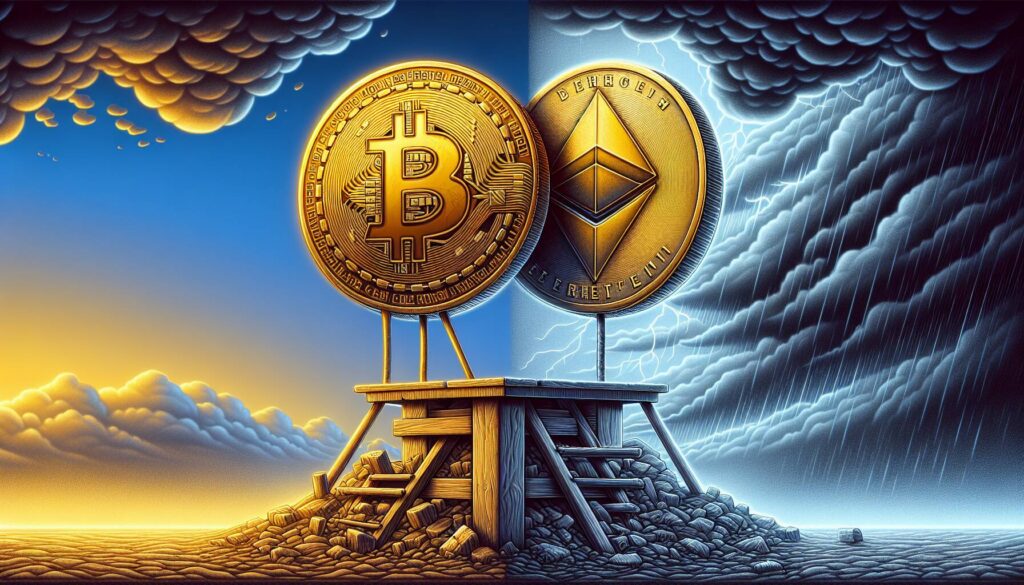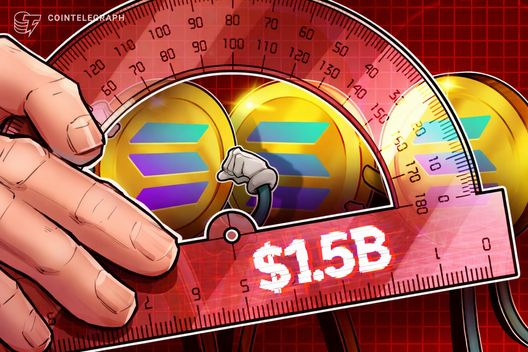Bitcoin’s recent performance has been a rollercoaster, particularly following GameStop’s announcement regarding its bitcoin treasury strategy. This move initially propelled Bitcoin’s price toward the significant ,000 mark, yet as of Wednesday during U.S. trading hours, it faced a notable downturn, retracting about 3% to around ,500. This drop coincides with a broader decline in the cryptocurrency market, as reflected in the CoinDesk 20 Index, which fell by 1.9% over the past 24 hours.
The recent cryptocurrency fluctuations are mirroring trends in traditional U.S. markets, where indices like the S&P 500 and Nasdaq faced declines of 0.8% and 1.6%, respectively. Such movements have been attributed to heightened caution surrounding the U.S. debt ceiling, with the Congressional Budget Office issuing warnings that governmental funds may run dry as soon as August if lawmakers do not act. Adding to the anxiety, potential new tariffs scheduled to roll out on April 2 may also weigh on market sentiment.
“Uncertainty surrounding U.S. trade policy and the broader political landscape remains front of mind,” noted analysts at hedge fund QCP in a recent Telegram broadcast. “The market still lacks clarity on the scope, timing, and magnitude of these potential actions. Until then, we expect more sideways volatility.”
Amidst this uncertainty, the cryptocurrency community is left pondering whether the enthusiasm surrounding GameStop’s bitcoin investment signals a bullish trend or simply reflects a desperate attempt at recovery by companies considered “zombie” firms struggling to regain footing. James Check, a noted analyst, has expressed skepticism over such moves, suggesting they could indicate a topping signal for the market. His outlook reflects an ongoing concern that reminiscent of the excessive sell-side pressures witnessed during the previous bear market.
This combination of factors has left Bitcoin bulls in a state of confusion, as they navigate through a landscape characterized by mixed signals and broader economic concerns. As traders and investors digest these developments, the future trajectory of Bitcoin and the wider crypto market remains closely watched.

Bitcoin Market Trends and Concerns
Key points regarding Bitcoin’s price movements and market sentiment, along with their potential impacts on readers:
- Bitcoin’s Price Drop:
- Bitcoin recently peaked just below ,000 but saw a 3% decrease to around ,500.
- The decline was part of a broader downturn in the cryptocurrency market.
- Impact of U.S. Financial Markets:
- The S&P 500 and Nasdaq indexes experienced losses, indicating a risk-off sentiment among investors.
- Such fluctuations can influence investor behavior and market momentum in cryptocurrencies.
- Debt Ceiling Concerns:
- Warnings from the Congressional Budget Office about a potential government shutdown in August due to the debt ceiling may add to market uncertainty.
- Readers should consider how legislative decisions can affect their investments, especially in volatile assets like Bitcoin.
- Trade Policy Uncertainty:
- Investor nerves may be heightened due to the upcoming tariffs and ongoing trade policy discussions.
- A lack of clarity surrounding these issues could lead to continued market volatility.
- Reaction to GameStop’s Bitcoin Acquisition:
- GameStop’s decision to invest heavily in Bitcoin did not yield the expected bullish response in the market.
- This raises questions about the impact of large players’ moves on market sentiment and price action.
“Until there is more clarity on the economic landscape, investors may experience continued sideways volatility.”
The Impact of GameStop’s Bitcoin Strategy on the Crypto Market
The recent announcement from GameStop regarding its bitcoin treasury strategy has certainly stirred waves within the cryptocurrency community, particularly as Bitcoin (BTC) approached the significant ,000 mark only to retreat shortly after. This scenario sheds light on both potential benefits and pitfalls for investors in the ever-volatile crypto landscape. The action has coincided with a notable downturn in U.S. equities, signifying a broader market sentiment that may leave those profiting from the crypto boom feeling uneasy. Specifically, Bitcoin’s ride to ,000 capped at ,500 showcases how fragile these gains can be, much like the fluctuations seen in the S&P500 and Nasdaq.
In comparison to traditional equities, the cryptocurrency market often reacts more sharply to announcements and market stimuli. GameStop’s venture into bitcoin could be viewed as a competitive advantage for those bullish on BTC, as it brings in a larger, more established player into the crypto sphere. However, there’s a flip side. The skepticism surrounding whether a struggling company like GameStop can effectively influence bitcoin’s value raises questions. Analysts suspect this could actually act as a “topping signal,” indicating that large institutional investments might not necessarily translate to sustainable market health.
On one hand, traders who thrive on volatility may find new opportunities arising from the price swings instigated by GameStop’s involvement, especially as sentiments flip-flop between bullish and bearish. This could open avenues for seasoned traders to capitalize on short-term dynamics. Conversely, for more cautious investors or those new to the crypto scene, such fluctuating prices and external market fears—particularly concerning the U.S. debt ceiling—present an environment fraught with risk. As per insights from QCP Capital, the overall uncertainty surrounding U.S. trade policy is likely to cause continued sideways volatility, which may frustrate investors seeking clarity.
The psychological impact of GameStop buying BTC cannot be underestimated. For crypto advocates, this signals validation of the medium; nevertheless, for bearish investors, it further reinforces concerns over the market being propped up by “zombie companies,” leading to questions about fundamental valuations. This split could alienate traditional investors seeking stability, while simultaneously attracting those who embrace crypto’s disruptive potential—demonstrating that while GameStop’s involvement might foster a new wave of enthusiasm, it could also deepen divides in investor sentiment across the crypto landscape.

















